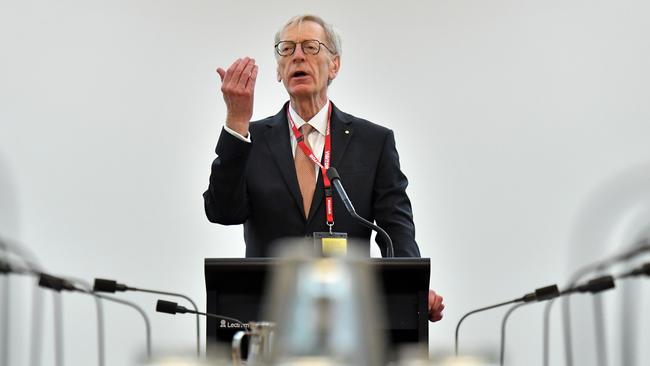Banks break out wagyu and shiraz after responsible lending victory
The responsible lending debate grew heated through the Hayne royal commission, but ASIC’s position has been blown out of the water.

In the 12 months before the Hayne royal commission kicked off in 2018, banks were scrambling to come to grips with their responsible-lending obligations and were tightening lending standards.
At the same time, daunting research by UBS in 2017 coined the phrase “liar loans” after a survey of borrowers found that up to $500bn of mortgages on local banks’ books were based on factually incorrect applications.
The research found almost a quarter of respondents had lied to get a loan, either by understating expenses and other debts or inflating income and assets.
Those findings were startling and had regulators on edge, while revelations of broader scandals in the banking sector were increasing. The royal commission was established in December 2017 and the industry was on notice that its dirty laundry would be aired.
The Hayne royal commission heard the disturbing stories of banks lending to those who couldn’t afford to repay. That included Commonwealth Bank extending thousands of dollars in extra credit to a problem gambler, who had informed the bank just days earlier of his gambling problem.
In light of a host of factors, including the regulatory focus and royal commission, banks were starting to reduce their reliance on expense formulas and benchmarks to assess loans, and were adding more granular questions in applications on outgoings.
In his final report, royal commissioner Kenneth Hayne maintained the status quo by saying the National Consumer Credit Protection Act 2009 should not be amended in relation to responsible lending, as consumer protection groups were pushing for at the time.
Mr Hayne said banks were already sharpening their processes and Federal Court action between the Australian Securities & Investments Commission and Westpac should be allowed to run its course.
“If the court processes were to reveal some deficiency in the law’s requirements to make reasonable inquiries about, and verify, the consumer’s financial situation, amending legislation to fill in that gap should be enacted,” the final report says.
“If appropriately managed, ensuring the industry consistently meets the requirements of existing laws will likely enhance rather than detract from macroeconomic performance.”
But the situation has markedly changed since Hayne published those words with a pandemic sweeping the world and Australia enduring its first recession in almost three decades.
Last year, the unintended consequences of the responsible lending regime were also starting to become clearer.
Senior Reserve Bank operatives were privately expressing concern about the overly cautious stance the banks were taking on lending criteria and standards, pointing to very low levels of credit losses as evidence that loan risk appetite was too low.
Bank chief executives including ANZ’s Shayne Elliott had pulled the handbrake too hard for fear of being found to be out of step with the responsible lending rules.
It was in August 2019, though, that ASIC’s position started coming unstuck when Federal Court judge Nye Perram dismissed claims Westpac breached responsible lending practices when assessing customer applications. The judgment was soon being referred to as the “wagyu and shiraz” ruling.
Justice Perram said requiring banks to comb over expenses left out that it was “always possible that some of the living expenses might be foregone” by potential borrowers to meet repayments.
“I may eat wagyu beef every day washed down with the finest shiraz but, if I really want my new home, I can make do on much more modest fare,” he explained.
ASIC continued to forge ahead, lodging an appeal and holding public hearings on responsible lending in Sydney and Melbourne ahead of releasing a revised regulatory guide on the topic in December to clarify its position.
But ASIC’s appeal failed as COVID-19 was buffeting the domestic economy, fanning fears about the availability of credit. The federal government wanted to ensure credit continued to flow freely as a top priority.
Documents released under Freedom of Information show the corporate regulator made a decision on July 20 not to seek leave to appeal to the High Court. The decision was referred to in a email from Treasury financial system division adviser Nghi Luu to colleagues, and was followed by an ASIC media release on July 22.
“ASIC is mindful of the impact of the additional time required to resolve this matter in the current challenging economic circumstances,” the regulator said in July.
“ASIC will review its updated regulatory guidance RG209 … and will consider what implications the Federal Court decision has.”
Just two months later, ASIC’s position was blown out of the water on Friday when the government said it was dismantling the regime in its current form, labelling it “overly prescriptive, complex and unnecessarily onerous on consumers”.
The next step is stakeholder consultation before finalising legislation to implement reform.
The latest twist in the responsible lending saga had the banking sector raising a glass of shiraz on Friday.







To join the conversation, please log in. Don't have an account? Register
Join the conversation, you are commenting as Logout